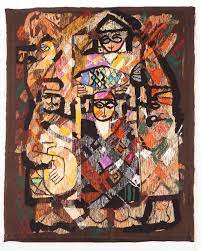DUBAI (Arabnews): Tunisian artist Safia Farhat was not only a dynamic tapestry creator, but had an impressive resumé including ceramicist, educator, women’s rights activist, and publishing pioneer. She was a woman who accumulated a list of historic firsts in her lifetime.
She contributed to the growth of visual culture in independent Tunisia under the progressive leadership of President Habib Bourguiba. Farhat designed national stamps, had her fiber art displayed in the country’s banks, hotels, and schools, and worked with expert weavers and artisans in her studio.
Farhat was born in the harbor city of Rades in 1924 and raised in a well-to-do family. It was her maternal aunt, who was skilled in knitting and crochet, who cultivated Farhat’s love of art. She went on to study at the Tunis Institute of Fine Arts and was reportedly just the third Tunisian woman to enroll there.
She later became the institute’s first female director in 1966 — remaining in the role for more than a decade. She encouraged female students to take part in the institute’s programming. Farhat also founded Tunisia’s first magazine for women, “Faiza,” delving into feminism and decolonization, among other social issues.
Her colorful, thickly lined tapestries depict animals, plants, and men and women wearing traditional clothing. “When I saw her work, I was really fascinated by its sculptural elements, the color, the various techniques that were embedded in it — and by their stories,” Jessica Gerschultz, a professor of African studies at the University of Kansas, told Arab News.
)
“She seems to really play on self-referentiality,” she continued. “Her works are referring to her other works, so there are many symbols — lots of triangles and zigzags — integrated into her weavings and other works that she did in ceramics and iron.”
Farhat, who died in 2004, is a name still recognized by some older people in her homeland, but she has been generally overlooked, ironically, by young art students in Tunisia. “At the institute, maybe students know her name, but they’re not very familiar with her,” noted Gerschultz. “Maybe they don’t know her at all.”
International interest in Farhat, however, was boosted last year as a result of her works being showcased at the Venice Biennale. “It’s wonderful to see her contributions now being viewed more widely,” said Gerschultz.







